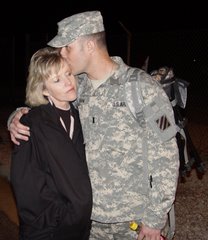
Spc. Mikail Lawal, a petroleum specialist assigned to Company A, 203rd Brigade Support Battalion, 3rd Heavy Brigade Combat Team, 3rd Infantry Division, reads from the Quran, the holy book of Islam, at Forward Operating Base Kalsu, Iraq, Jan.4. Lawal, a devout Muslim, is attempting to become a Muslim chaplain in service of his country.
Story and photos by Sgt. Ben Hutto, 3rd HBCT Public Affairs Office
FORWARD OPERATING BASE KALSU, Iraq – Before traveling to America, he was born in Nigeria and lived there for 22 years. His father, a village elder and Muslim religious leader, made an early impression on his life; an impression that is still left on him today as he attempts to become an Army chaplain.
He traveled to America, in 1995, to become an All-American tennis player at Morehouse University in Atlanta. While at Morehouse, he is also earned a Bachelors of Science degree in psychology
Unassuming and respectful, Spc. Mikail Lawal, a petroleum specialist assigned to Company A, 203rd Brigade Support Battalion, 3rd Heavy Brigade Combat Team, 3rd Infantry Division, has seen more of the world than his ranks would suggest.
Lawal, who is working as an attendant at the Forward Operating Base Kalsu airfield, does his best to be professional and helpful to the Soldiers and civilians who are leaving or coming to the FOB. Whether it be helping passengers with their bags or informing them of flight times, Lawal ensures that travelers get on the right helicopter at the proper time.
It can, at times, be a thankless job, but Lawal views it as another opportunity to help people.
“I can make money many ways,” he said. “The money will come no matter what job I do. Anything I do, I do because I really care about it. I know I will be successful; it’s a matter of when that will happen. What can I do in between those times to help people? That is the more important thing.”
His giving attitude comes from two sources; his deep faith in Islam and the example his father set for him at an early age. Not surprisingly, both are uniquely intertwined.
“He was a figure that everyone respected,” said Lawal. “No one wanted to wrong him; he was that peaceful of a man. He is my example as man and a teacher.”
Another lasting gift given to Lawal by his father was the opportunity to go on the annual Islamic Pilgrimage called the Hajj. As one of the five pillars of the Islamic faith, a trip to Mecca is extremely important for any Muslim. To be able to go on the Hajj was an even greater honor, according to Lawal. It was an eternal gift from his father, the chance to deepen his understanding of the faith. He journeyed from Nigeria to Mecca with his mother and sister to participate in the spiritual event. Upon return, his life was changed forever
“It is a feeling you can never explain,” he said. “You leave there changed. It was like being touched by a spirit. To go through that was simply phenomenal. It is that simple.”
While his faith is his foundation, tennis is one of Lawal’s passions. He was so skilled at the sport; he was able to use his ability to secure a tennis scholarship to Morehouse. He played there from 1995 to 1997, where he became a collegiate All-American.
Lawal continues to teach tennis at his academy.
“I’m still playing tennis,” he said. “I don’t compete as vigorously now that I’m in the Army, but it will always be one of my professions. My tennis academy means a lot to me. On all my business cards for the school, the phrase “I teach because I care” is on them. For me, tennis is another way to help people.”
That spirit of service has also led Lawal to pursue becoming an Army chaplain.
“There are a small number of Muslim chaplains,” he said. “There are a lot of wrong misconceptions about the faith. It is a very noble faith. It requires a person to put everything in the hands of their creator. It requires total submission to the will of God. It is not what many people think.”
Lawal leads a small worship service for the FOB’s Muslims every Friday. He normally has 12 people who attend the meeting. Brigade Soldiers, security guards and contractors make the varied congregation.
“I think worship gives you more benefit if you have a congregation,” said Lawal. “There is a reward in seeing a change in person. It rubs off on everyone. I would say to be in the presence of Godly people makes someone stronger.”
Lawal doesn’t find being a spiritual teacher as a burden. He views his role as a way to demonstrate love to his fellow man.
“It is very simple,” he said. “You show people love. You don’t even have to say it. People just need to see that you care about them. You just need to be constant in your role. You cannot start off one way and change.”























